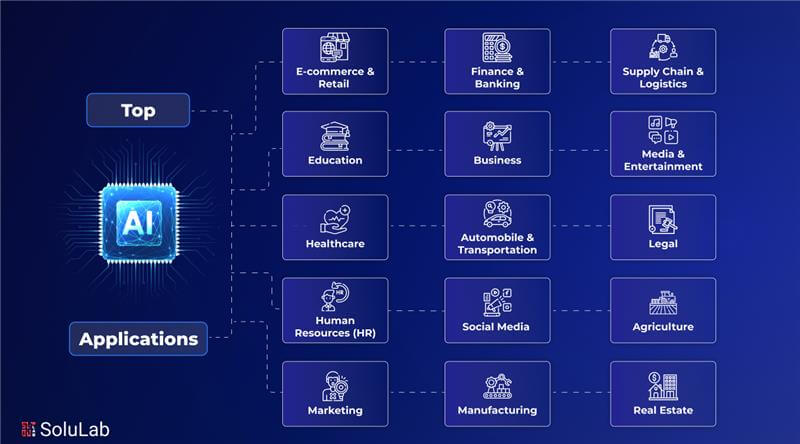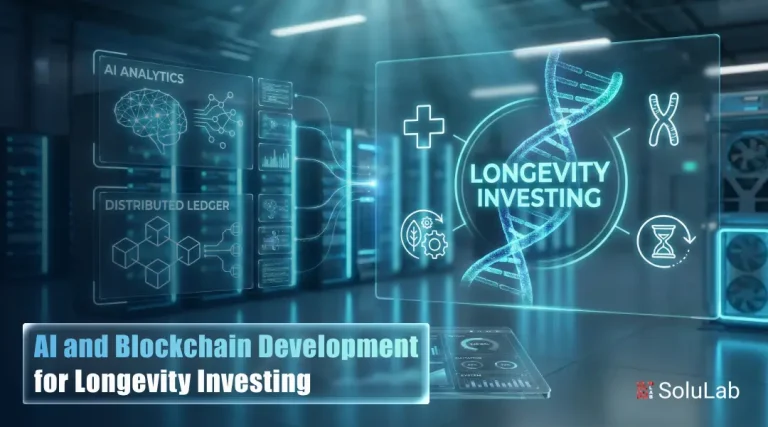
What if machines could think, learn, and make decisions just like humans, the difference being that they are only a bit faster and smarter?
From automating everyday tasks to upgrading operations in industries like healthcare, finance, and entertainment, Artificial Intelligence is no longer a concept of the future—it is the present, evolving faster than ever before. As we step deeper into 2026, AI is not only reshaping how we work and live but also opening doors we never knew existed.
The world is becoming more digital as AI trends are integrated with various applications and gadgets. In this blog, we will look at the top 10 applications of artificial intelligence in 2026 in every possible sector.
So, without any ado, let’s get started!
Facts and Figures About Artificial Intelligence
Artificial intelligence (AI) is the development of computer systems that can do tasks that normally require human intelligence. These tasks cover a wide range of activities, including problem solving, learning, speech recognition, and decision-making.
Some of the recent stats:
- The global AI market is worth $391 billion, with an increase of around $195 billion since 2023. The market is expected to grow at a CAGR (2024 – 2030) of 37.3% by 2030.
- A jaw-dropping number: 83% of organizations say that AI integration is a major priority for their future business plans.
- AI holds the potential to boost employee productivity by approximately 40% by 2035.
- By 2025, AI is expected to eliminate 85 million jobs but create 97 million new ones, resulting in an overall gain of 12 million jobs.
- The US AI market size is anticipated to reach around $300 billion by 2026.
Now, let’s look at how AI is applied in different industries.
Top AI Applications To Consider in 2026
1. E-commerce & Retail
-
Personalized Product Recommendations
AI for E-commerce uses browsing and purchase history to tailor product suggestions, increasing conversion rates and improving customer satisfaction by offering relevant items.
-
Chatbots & Virtual Shopping Assistants
AI-driven chatbots provide round-the-clock support for customer queries, returns, and product discovery, enhancing user experience and driving sales efficiency.
-
Dynamic Pricing & Inventory Management
AI analyzes demand trends, competition, and seasonality to automatically adjust pricing and optimize inventory, ensuring maximum profitability and reduced stockouts.
-
Seamless Customer Journey
AI-powered solutions simplify customer interactions with buying advice and smooth navigation, while Kommo’s AI agent streamlines chat management through smart replies and summaries, ensuring a seamless and consistent customer journey.
2. Education
-
AI-Powered Tutoring Systems
AI for Education adapts lessons to each student’s pace and learning style, offering personalized guidance and instant feedback to enhance results.
-
Automated Grading & Assessment Tools
AI speeds up grading by analyzing student submissions with NLP and image recognition, enabling faster and more consistent evaluations.
-
Student Behavior & Performance Analytics
AI analyzes student data to predict academic success, identify learning gaps, and assess dropout risks, helping educators provide timely interventions.
3. Healthcare
-
AI in Medical Imaging & Diagnostics
AI in Healthcare analyzes medical images with high accuracy, assisting in the early detection of diseases like cancer, strokes, or fractures for faster diagnosis and treatment.
-
Drug Discovery & Development
AI models accelerate drug research by identifying promising compounds and predicting their effectiveness, cutting down time and costs in bringing new drugs to market.
-
Virtual Health Assistants
AI-powered chatbots and voice assistants provide 24/7 symptom checks, health monitoring, and personalized advice, enhancing patient care and engagement.
4. Business
-
Process Automation with AI Bots
AI bots automate repetitive tasks like data entry, invoicing, and customer support, improving operational efficiency and reducing human error.
-
AI-Powered Decision Support Systems
AI in Business analyzes vast data sets to provide actionable insights, helping businesses make informed and reliable decisions quickly.
-
Predictive Analytics for Sales & Growth
AI models forecast market trends and customer behavior, enabling businesses to proactively adjust strategies for optimal sales and growth.
5. Human Resources (HR)
-
Resume Screening & Talent Matching
AI in HR filters and ranks resumes based on job requirements, streamlining recruitment by matching the right candidates with suitable roles.
-
Employee Sentiment Analysis
AI analyzes employee feedback and communication to measure confidence, identifying potential issues and helping HR teams improve workplace culture.
-
Onboarding Automation
AI-powered chatbots guide new employees through the onboarding process, providing information and training while reducing manual effort.
6. Marketing
-
AI Content Generation
AI for content creation creates blogs, social media posts, and ad copies in seconds, helping marketers produce consistent and engaging content at scale.
-
Customer Journey Personalization
AI customizes content and messaging based on individual user behavior, preferences, and touchpoints, boosting engagement and conversions.Pairing these efforts with customer journey analytics software helps businesses visualize the full path to purchase and make data-driven improvements.
-
Predictive Campaign Analytics
AI analyzes past campaign data to forecast performance, optimize targeting, and refine future marketing strategies.
7. Finance & Banking
-
Fraud Detection & Risk Management
AI monitors transactions in real time to detect anomalies and prevent fraudulent activities, ensuring secure banking operations.
-
AI-Powered Chatbots for Banking
Virtual assistants handle customer queries, assist with transactions, and provide financial guidance 24/7, improving service efficiency.
-
AI in Insurance
AI evaluates risk profiles, automates underwriting, and speeds up claims approval by analyzing documents and customer data efficiently.
8. Automobile & Transportation
-
Autonomous Driving & Assistance
AI enables self-driving capabilities and advanced driver assistance systems (ADAS) for safer and more efficient travel.
-
Traffic Pattern Prediction
There are many AI-based route management software which easily analyze real-time and historical data to optimize traffic flow, reduce congestion, and improve route planning.
-
Fleet Management Optimization
AI helps companies monitor vehicle health, fuel usage, and driver behavior, improving logistics and reducing operational costs.
9. Social Media
-
Content Moderation & Fake News Detection
AI for Social media scans all the posts, images, and comments to detect harmful, inappropriate, or misleading content in real time.
-
Audience Sentiment Analysis
AI evaluates user reactions, comments, and engagement to understand public sentiment analysis and brand perception.
-
Smart Content Scheduling
AI identifies the best times to post and suggests content formats that maximize visibility and user interaction.
10. Manufacturing
-
Predictive Maintenance
AI monitors equipment performance to predict failures before they happen, reducing downtime and maintenance costs.
-
AI in Quality Control
Computer vision, powered by AI, detects defects or inconsistencies in products during the manufacturing process with high accuracy.
-
Production Line Automation
AI-powered robotics and systems streamline repetitive tasks on the factory floor, improving speed, precision, and efficiency.
11. Supply Chain & Logistics
-
Route Optimization
AI analyzes real-time traffic, weather, and delivery data to determine the most efficient delivery routes.
-
Demand Forecasting
AI for demand forecasting predicts product demand using historical sales, market trends, and seasonal factors, helping avoid overstock or stockouts.
-
Warehouse Automation
AI-powered robots and systems manage inventory storage, picking, and packing, enhancing speed and accuracy in fulfillment.
12. Media & Entertainment
-
AI-Generated Music, Scripts, and Art
AI tools create original music, screenplays, and artwork, helping content creators in producing diverse creative assets quickly.
-
Content Recommendation Systems
AI suggests movies, shows, and music based on user preferences and viewing history, enhancing user engagement and satisfaction.
-
AI in Gaming
AI drives game development by creating adaptive, intelligent NPCs (non-playable characters) and personalizing in-game experiences for players.
13. Legal
-
Contract Analysis
AI for Legal process analyzes documents, highlighting potential risks, clauses, and inconsistencies, speeding up contract review processes.
-
Legal Research Automation
AI accelerates legal research by quickly scanning case law and statutes, saving time and improving accuracy for lawyers.
-
Regulatory Compliance Monitoring
AI-enabled data archiving tracks changes in regulations and ensures businesses remain compliant by analyzing vast amounts of legal data in real time.
14. Agriculture
-
Crop Health Monitoring
AI-powered drones and imaging systems monitor crop health, detecting diseases and pests early to optimize yields.
-
Smart Irrigation & Farming
AI analyzes soil moisture and weather data to optimize irrigation schedules, conserving water and ensuring efficient resource use.
-
Yield Prediction Models
AI models predict crop yields by analyzing environmental factors, helping farmers plan better and reduce waste.
15. Real Estate
-
AI-Based Property Valuation
AI uses market data, trends, and property features to provide accurate and dynamic property valuations.
-
Virtual Tours & Chat Assistants
AI creates immersive virtual property tours and offers chatbot assistance, making property browsing and inquiry management more interactive.
-
Lead Scoring
AI analyzes buyer behavior to predict conversion potential, helping real estate agents focus on high-value prospects.
Why Are Businesses Turning to Artificial Intelligence?
Artificial Intelligence (AI) is being used because people are finding automation to be a useful solution to the increasing demands of daily work. The strategic approach taken by these new AI apps not only frees up workers from repetitive tasks but also increases overall productivity. AI is also used by businesses to recruit and engage qualified workers, which promotes the expansion and advancement of the business.
In modern business practices, there is a widespread desire among companies to automate mundane and repetitive operations. The common notion is that such routine functions may be automated using simple apps. As data science advances, automation becomes more widespread. Online chat portals are one popular application of AI in this area, where automated welcome messages greet visitors on websites, sparking genuine conversations. This mirrors a broader trend in which businesses want to use Conversational AI to automate everyday processes and capitalize on the changing landscape of data science.
Conclusion
The applications of Artificial Intelligence (AI) in 2026 show a dynamic and profound evolution across multiple industries. AI’s transformational impact is evident, from its use in self-driving cars and healthcare advancements to its involvement in tailored marketing and gaming. As these applications continue to improve and change processes, the future promises a landscape brimming with opportunities, driving both efficiency and innovation.
SoluLab stands out as a leading AI development company for those looking to get a grasp on the potential of AI for their unique business projects. We provide a wide range of AI development services while taking care of customizable solutions to meet your specific business needs. Whether you want AI integration into existing systems, build a custom AI solution, or hire AI developers, we cater to all your technical demands, making you free for your business endeavors.
FAQs
1. How will AI impact the healthcare industry in 2026?
AI is significantly influencing healthcare by improving diagnostics through medical imaging analysis, assisting in personalized medicine, and facilitating predictive analytics for patient care. These applications contribute to improved outcomes, cost-effectiveness, and overall efficiency in healthcare delivery.
2. What role does AI play in the gaming industry today?
In the gaming industry, AI is creating realistic NPC behaviors, procedural content generation for diverse gaming environments, and adaptive difficulty systems. Additionally, AI contributes to dynamic pricing optimization, personalized gaming experiences, and enhancing anti-cheat measures for online multiplayer games.
3. How does AI modernize social media interactions?
AI in social media includes content recommendation systems for personalized feeds, image and video recognition for content moderation, sentiment analysis for understanding user opinions, and chatbots for instant customer interactions. These applications enhance user experiences and contribute to more targeted marketing.
4. What are the top AI applications in marketing strategies?
Some of the top AI applications in marketing include predictive analytics for data-driven decision-making, personalized customer experiences through tailored recommendations, chatbots for automated customer interactions, dynamic pricing optimization, and content creation and curation.
5. How does AI automate routine tasks in everyday life?
AI automates routine tasks in everyday life by leveraging algorithms for efficiency. This includes automated administrative tasks in education, spam filters in emails, and voice assistants for additional learning materials and support without direct human interaction.
6. How can SoluLab assist in AI application development services?
SoluLab, as a leading AI application development company, offers a range of services including AI integration for existing systems, custom AI solution development, and hiring of dedicated AI developers. Our custom solutions cater to specific project needs, ensuring the best use of advanced AI technologies for ultimate results.






